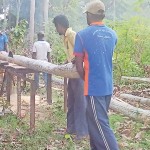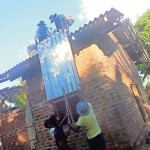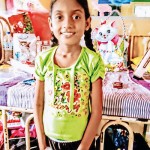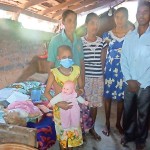News
Little money, but brimming over with humanity
View(s):In this time of gloom comes a story of great faith and goodwill where the humble people of the village, Palagala Bamunugama in the North Central Province, led by their chief priest come together to build a home for a cancer-stricken girl and her family
- The village temple: Maha gedara to all the villagers
- A show of unity: Each one does their bit to help a family in need
- Navodini and her family: Now they have a proper home instead of a crumbling mud hut
While eight-year-old Navodini was in Colombo to have surgery on her cancerous leg, her village did something wonderful. They built the impoverished family a house—with volunteers from among themselves—so the little girl wouldn’t have to return to a crumbling mud hut.
The closest town to Palagala Bamunugama is Kekirawa in the North Central province. Its 130 families are mostly farmers. Some make bricks. Everyone depends on daily wages. And nobody is affluent. There is an urgent need for safe drinking water.
The village is nestled between two wildlife reserves—Kahalla Pallekele Sanctuary and the Kalawewa National Park. Wild elephants enter every evening, forcing families to stay awake till morning to try and save life and property.
The village’s strong point is unity. “It is a special characteristic, something I haven’t seen in many other places,” said Ven Kosgahahinne Vajiragnana Thera, the 32-year-old chief monk, via telephone. “I came here in 2014 and set up the temple. Everything was built up through volunteerism. Nobody took a cent. People here treat the temple as their ‘maha gedara’. This is where their hearts are.”
Within months, the temple had patrons and a youth organization. The village death society was reactivated. And the Sunday school, where Navodini and her two older sisters were regulars, teemed with children.
One day, the girl stopped attending. It was Ven Vajiragnana Thera’s practice that, when a child skipped Sunday school, he would inquire why. Navodini’s father, J M Sunil Jayasundere, told him his daughter complained of a leg pain so bad that she would scream in agony. The parents had put it down to bruising.
But Ven Vijaragnana Thera urged him to consult a doctor in Kekirawa. The medic didn’t detect anything on the X-ray and prescribed painkillers. When the problem persisted, they took her to a hospital in Anuradhapura where tests caused doctors to suspect cancer.
After a series of transfers, Navodini ended up at the Apeksha Hospital Maharagama where they confirmed these fears. She had a particularly aggressive form of bone cancer in her leg and an operation would cost over Rs 1mn. It was a mind-boggling sum for the family.
Every year, numerous children—sometimes as young as five—are diagnosed with bone cancer. They require chemotherapy followed by surgery to remove the affected area and to insert a prosthesis. (Some undergo amputation). The procedures are costly, between Rs 800,000 and Rs 2.8mn, and not included in Sri Lanka’s free healthcare system.
There followed a fundraiser for Navodini. The donors did not wish to be named but among them are doctors who often silently contribute money and professional services towards needy families. They also approach friends and contacts who delve into their pockets. One doctor has so far helped find monies for around 15 children and says there are many more, also in other areas of medicine.
Navodini’s surgery was done. But there were other concerns. Back in the village, she lived with her family in a decaying mud hut. Not only were the conditions not sanitary enough for a recuperating patient, the toilet with its squatting pan would be impossible for the little girl to navigate.
It was Ven Vajiragnana Thera who floated the idea of building them a house. He was quickly supported by the temple’s patrons and inhabitants.
First, they took down the hut with its roof of woven palm fronds. Sunil had already laid the foundation for two rooms when his daughter’s illness surfaced. They improved on it.
“We started with no money but a lot of goodwill and faith,” said Ven Vajiragnana Thera. “Sunil had also made some bricks to sell. I told him not to sell it and we took it for the house. We have seven masons in the village. They worked for free.”
They bought things on loan from hardware stores. Ven Vajiragnana Thera appealed to some donors who had once helped him buy shoes and clothes and school supplies for children. They gave asbestos sheets for roofing. An electrician from the village did the wiring. The cables were taken on loan (for a discount) and a doctor later met the Rs 15,000 cost.
“All the young people of this village pitched in, helping the masons and doing odd jobs,” Ven Vajiragnana Thera related. “For wood, we cut down some trees on Sunil’s property while a neighbour said we can also take his trees for no charge. We got a machine and cut planks ourselves.”
A mason with roofing expertise laid the asbestos sheets. “All any of these people ever had in return were cups of plain tea,” the monk said. “We have yet to install a bathroom with a commode because we are expecting a donation of the necessary fittings. There is still some work to be done in the rooms, including tiling of Navodini’s sleeping quarters. But we have made great progress.”
Navodini celebrated her eighth birthday only the other day. She was due back at the weekend. Her prognosis, according to doctors, could be better. The type of cancer she has is “a bad one”.
“Everyone in our village felt deeply for this family,” Ven Vajiragnana Thera said. “They are an innocent family that harms nobody. And they get along so well with everyone. One thing this experience taught us is that, while we may not have much money, but we are brimming over with humanity.”







